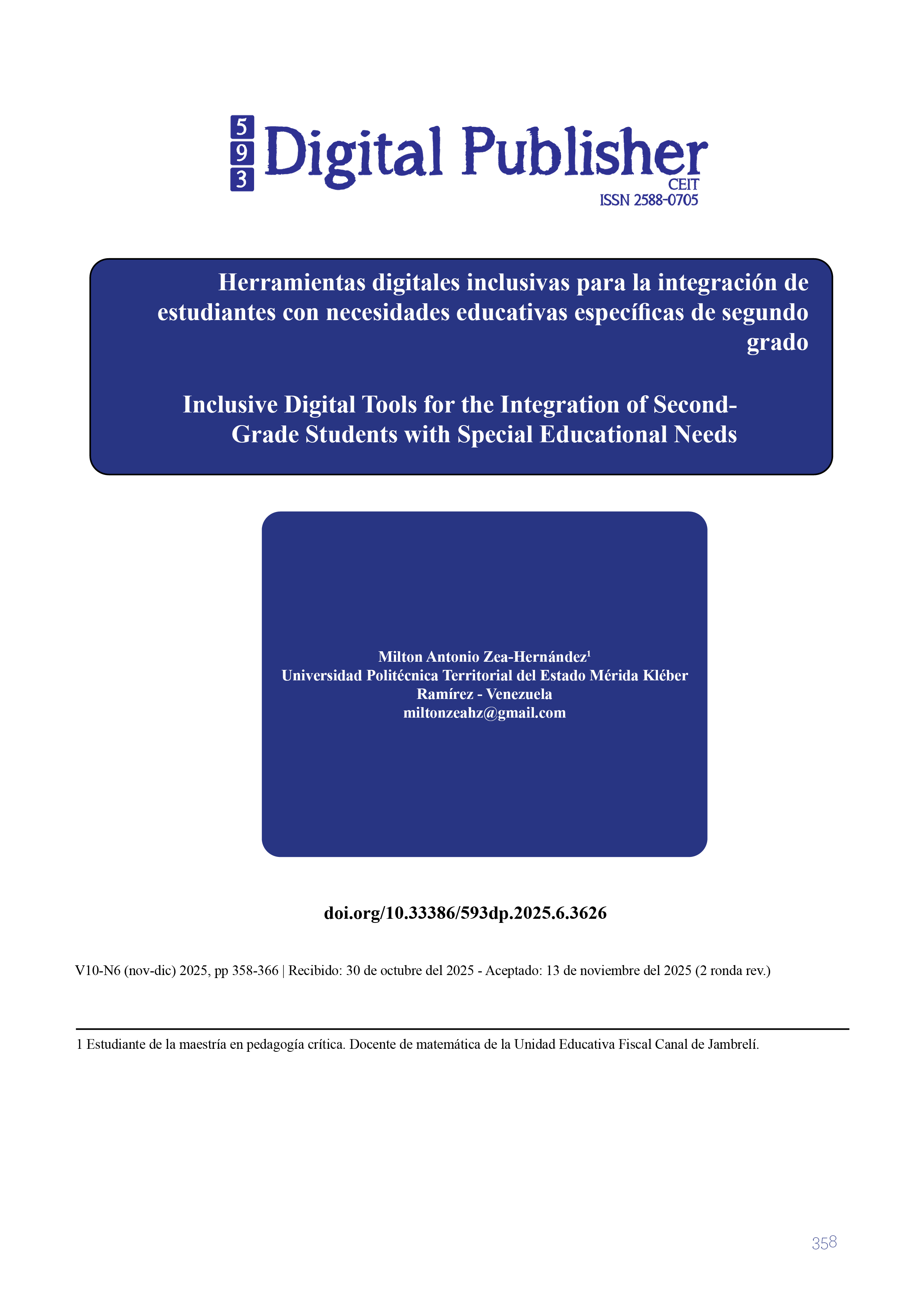Inclusive Digital Tools for the Integration of Second-Grade Students with Special Educational Needs
Main Article Content
Abstract
This study examines the role of digital accessibility and Information and Communication Technologies (ICT) in promoting inclusive education for students with Special Educational Needs (SEN) in Ecuador. Using a mixed, descriptive–exploratory, and participatory action approach, data were collected from eight teachers and sixty second-grade students at the “Ranulfo Aureliano Rodríguez” School in Guayaquil. Questionnaires, semi-structured interviews, and classroom observations were employed, and data triangulation ensured analytical consistency. Findings reveal that digital inclusion improves when teachers combine techno-pedagogical competence with a critical understanding of functional diversity. Nevertheless, structural barriers persist, including insufficient resources, workload overload, and limited professional training. The study concludes that digital accessibility, integrated with critical pedagogy, enhances student participation, self-regulation, and educational equity, offering a replicable model for Latin American contexts. It recommends continuous teacher training, cooperative methodologies, and didactic resources grounded in Universal Design for Learning (UDL).
Downloads
Article Details

This work is licensed under a Creative Commons Attribution-NonCommercial-ShareAlike 4.0 International License.
1. Derechos de autor
Las obras que se publican en 593 Digital Publisher CEIT están sujetas a los siguientes términos:
1.1. 593 Digital Publisher CEIT, conserva los derechos patrimoniales (copyright) de las obras publicadas, favorece y permite la reutilización de las mismas bajo la licencia Licencia Creative Commons 4.0 de Reconocimiento-NoComercial-CompartirIgual 4.0, por lo cual se pueden copiar, usar, difundir, transmitir y exponer públicamente, siempre que:
1.1.a. Se cite la autoría y fuente original de su publicación (revista, editorial, URL).
1.1.b. No se usen para fines comerciales u onerosos.
1.1.c. Se mencione la existencia y especificaciones de esta licencia de uso.
References
Ainscow, M. (2020). Promoting inclusion and equity in education: Lessons from international experiences. Routledge. https://doi.org/10.4324/9780429440235
Alba Pastor, C. (2018). Diseño Universal para el Aprendizaje: Un modelo didáctico para proporcionar oportunidades de aprender a todos los estudiantes. Padres y Maestros / Journal of Parents and Teachers, (374), 21–27. https://doi.org/10.14422/pym.i374.y2018.003
Alba-Pastor, C. (2018). Diseño Universal para el Aprendizaje: Educación para todos y prácticas de enseñanza inclusivas. Morata.
Braun, V., & Clarke, V. (2021). Thematic analysis: A practical guide. SAGE Publications.
Cabero, J., & Llorente, M. C. (2009). Las tecnologías de la información y la comunicación para la atención a la diversidad. Pixel-Bit. Revista de Medios y Educación, (34), 15–28. https://doi.org/10.12795/pixelbit.2009.i34.02
Crisol Moya, E. (2019). Hacia una educación inclusiva para todos: Nuevas contribuciones. Profesorado: Revista de Currículum y Formación del Profesorado, 23(1), 1–9. https://doi.org/10.30827/profesorado.v23i1.9155
Delgado Valdivieso, K. V. (2021). Educación inclusiva en la educación superior: Propuesta de un modelo de atención en Ecuador. Revista de Ciencias Sociales (Ve), 27(E-3), 14–27. https://doi.org/10.31876/rcs.v27iE-3.36542
Desombre, C. L., Lamotte, M., & Jury, M. (2021). What drives attitudes toward inclusive education? The role of social dominance orientation and multicultural beliefs. Teaching and Teacher Education, 102, 103334. https://doi.org/10.1016/j.tate.2021.103334
Echeita, G. (2017). Educación inclusiva: Sonrisas y lágrimas. Aula Abierta, 46(1), 17–24. https://doi.org/10.17811/rifie.46.1.2017.17-24
Echeita, G. (2021). La educación del alumnado con necesidades educativas especiales en la LOMLOE. Avances en Supervisión Educativa, 35, 1–17. https://doi.org/10.23824/ase.v0i35.721
Echeita, G., Simón, C., & Verdugo, M. Á. (2019). Schools for all: Inclusive education in Spain. International Journal of Inclusive Education, 23(12), 1301–1317. https://doi.org/10.1080/13603116.2018.1516820
Ediyanto, W., Sulaiman, M., & Mirafuentes‐Cruz, P. (2025). Triangulation in qualitative research: A comprehensive guide. Educational Research Review, 45, 100850. https://doi.org/10.1016/j.edurev.2025.100850
Freire, P. (1996). Pedagogía del oprimido. Siglo XXI Editores.
Gallegos Navas, M. M. (2019). La inclusión de las TIC en la educación de personas con discapacidad: Relatos de experiencias. Editorial Universitaria Abya-Yala.
Grant, P. D., Longhurst, J. M., & Thier, M. (2024). Rural definition triangulation: Improving the credibility and transferability of rural education research. Journal of Research in Rural Education, 40(1). https://doi.org/10.26209/JRRE4001
Hassanein, E. A., Al-Darwish, S., & AlNaimi, M. (2021). Teachers’ attitudes toward inclusive education in the Gulf region. Teaching and Teacher Education, 104, 103372. https://doi.org/10.1016/j.tate.2021.103372
Ismailos, L. (2022). Building inclusive classrooms: The role of critical pedagogy in diverse societies. International Journal of Inclusive Education, 26(10), 1087–1104. https://doi.org/10.1080/13603116.2021.1882058
Johnson, R. B., Onwuegbuzie, A. J., & Turner, L. A. (2021). Mixed methods research: A research paradigm whose time has come. Educational Researcher, 50(3), 178–192. https://doi.org/10.3102/0013189X211020171
Lamsal, H. L. (2024). Critical pedagogy in addressing social inequality and promoting social justice in education. Advances, 5(3), 77–83. https://doi.org/10.11648/j.advances.20240503.12
Lockwood, C., Munn, Z., & Porritt, K. (2018). Qualitative research synthesis: Methodological guidance for systematic reviewers. JBI Evidence Synthesis, 16(10), 2197–2209. https://doi.org/10.11124/JBISRIR-16-10-2197
Luque Espinoza de los Monteros, M. (2019). Las tecnologías de información y comunicación: Una gestión inclusiva de calidad educativa. Un Espacio para la Ciencia, 2(1), 59–78. https://revistas-manglareditores.org/index.php/espacio-para-la-ciencia/article/view/64
Munn, Z., Peters, M. D. J., Stern, C., Tufanaru, C., McArthur, A., & Aromataris, E. (2018). Systematic review or scoping review? Guidance for authors. BMC Medical Research Methodology, 18(1), 143. https://doi.org/10.1186/s12874-018-0611-x
Muntaner-Guasp, M., Forteza, D., & Salinas, J. (2022). Digital inclusion and universal design for learning in teacher education. Education and Information Technologies, 27(10), 13719–13736. https://doi.org/10.1007/s10639-022-11072-0
Opoku, M. P. (2022). Special educators’ intentions towards supporting practice of inclusive education for students with disabilities in secondary schools in Ghana. African Journal of Disability, 11, a875. https://doi.org/10.4102/ajod.v11i0.875
Opoku, M. P., Nketsia, W., & Agbenyega, J. S. (2021). Teachers’ attitudes and self-efficacy towards inclusive education: A systematic review. International Journal of Educational Research, 110, 101889. https://doi.org/10.1016/j.ijer.2021.101889
Prasse, D., & Narciss, S. (2024). Challenges in promoting self-regulated learning in digital environments: A review of reviews. Education and Information Technologies, 29, 12015–12042. https://doi.org/10.1007/s10639-024-11972-5
Rodríguez, M., & López, R. (2014). Herramientas digitales para la inclusión: Análisis de software y recursos TIC para distintas discapacidades. Digital Education Review, 25, 108–126. https://doi.org/10.1344/der.2014.25.108-126
Sadykova, A., & Bazarbayeva, A. (2024). The impact of a metacognition-based course on school students’ metacognition and comprehension. Frontiers in Education, 9, 1460496. https://doi.org/10.3389/feduc.2024.1460496
Sánchez-García, R., & García-González, E. (2025). Enhancing project-based learning: A framework for equitable and critical classrooms. Sustainability, 17(11), 4978. https://doi.org/10.3390/su17114978
UNESCO. (2021). Reimagining our futures together: A new social contract for education. UNESCO Publishing.
UNESCO. (2021). Inclusión y educación en tiempos de postpandemia: Ponencias del Foro Regional de Política Educativa 2020. UNESCO.


